

What is Mood? Definition of mood by Medical dictionary. Affect, Mood, and Emotion. 13 Mental Health Benefits Of Exercise. By Sophia Breene Many people hit the gym or pound the pavement to improve cardiovascular health, build muscle, and of course, get a rockin’ bod, but working out has above-the-neck benefits, too.
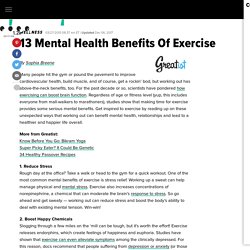
For the past decade or so, scientists have pondered how exercising can boost brain function. Regardless of age or fitness level (yup, this includes everyone from mall-walkers to marathoners), studies show that making time for exercise provides some serious mental benefits. Get inspired to exercise by reading up on these unexpected ways that working out can benefit mental health, relationships and lead to a healthier and happier life overall. More from Greatist:Know Before You Go: Bikram YogaSuper Picky Eater? 1. 2. 3. 4. 5. 6. 7. 8. 9. 10. 11. 12. 13. Working out can have positive effects far beyond the gym (and beach season). What inspires you to stay fit? Exercise and mental health. Exercise has many benefits, not only for your physical health but also your mental health.
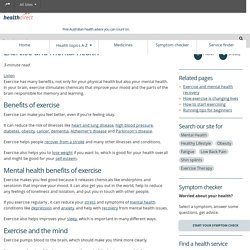
In your brain, exercise stimulates chemicals that improve your mood and the parts of the brain responsible for memory and learning. Benefits of exercise Exercise can make you feel better, even if you’re feeling okay. It can reduce the risk of illnesses like heart and lung disease, high blood pressure, diabetes, obesity, cancer, dementia, Alzheimer’s disease and Parkinson's disease. Exercise and mood. The positive link between exercise and mood Exercise can have an enormous impact on your mood.
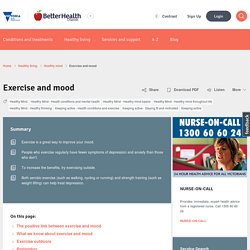
In fact, it is thought that exercise can be just as effective as anti-depressants in treating mild-to-moderate depression. Not only can exercise help in treating depression, it can also prevent people from becoming depressed again. So it's important to keep up an exercise regimen after people get better. We don't yet understand exercise and mood enough to know exactly which type of exercise is best - or how much - but what we do know is that it definitely has a positive effect. The Mental Health Benefits of Exercise: The Exercise Prescription for Depression, Anxiety, and Stress.
You already know that exercise is good for your body. The exercise effect. When Jennifer Carter, PhD, counsels patients, she often suggests they walk as they talk.
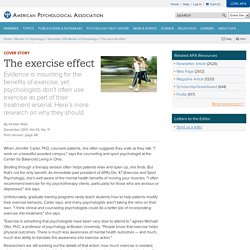
"I work on a beautiful wooded campus," says the counseling and sport psychologist at the Center for Balanced Living in Ohio. Strolling through a therapy session often helps patients relax and open up, she finds. But that's not the only benefit. As immediate past president of APA's Div. 47 (Exercise and Sport Psychology), she's well aware of the mental health benefits of moving your muscles.
"I often recommend exercise for my psychotherapy clients, particularly for those who are anxious or depressed," she says. The Mental Health Benefits of Exercise: The Exercise Prescription for Depression, Anxiety, and Stress. (PDF) The effects of exercise on mood changes:... [Effects of exercise on anxiety, depression and mood]. - PubMed - NCBI. The effects of exercise on mood and cognitive functioning. The Relationship between the Physical Activity Environment, Nature Relatedness, Anxiety, and the Psychological Well-being Benefits of Regular Exercisers.
Introduction In recent years, there has been a growing body of evidence suggesting that time spent in the presence of nature improves psychological health and well-being (Pretty, 2004; Bowler et al., 2010; Shanahan et al., 2016).
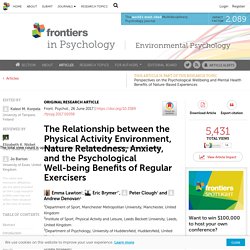
For example, Chang and Chen (2005) found that window views of nature and indoor plants were related with low anxiety related behaviors. Tension and anxiety increased when window views of nature and indoor plants were removed. Weinstein et al. (2009) found that exposure to natural environments enhanced caring behaviors and psychological well-being. (5) Neurotransmitters of the human body. Physical exercise and psychological well being: a critical review. Sports Psychology – Exercise and Psychological Well Being · The UK's leading Sports Psychology Website. In this article we shall look at the effects that exercise has on psychological well/ill being.
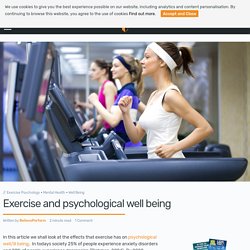
Participation in physical activity Research summary. (5) Brain And Neurotransmitters. (5) The brain-changing benefits of exercise. (5) Effects of Exercise on the Brain, Animation. Research into Health-Enhancing Physical Activity. (5) Many Benefits of Exercise: Mayo Clinic Radio. Barriers to Physical Activity - Physiopedia. Introduction Many technological advances and conveniences that have made our lives easier and less active, many personal variables, including physiological, behavioural, and psychological factors, may affect our plans to become more physically active.
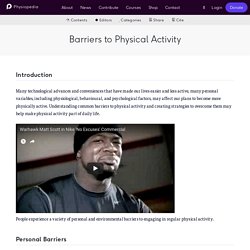
Understanding common barriers to physical activity and creating strategies to overcome them may help make physical activity part of daily life. People experience a variety of personal and environmental barriers to engaging in regular physical activity. Personal Barriers With technological advances and conveniences, people’s lives have in many ways become increasingly easier, as well as less active. The top three barriers to engaging in physical activity across the adult lifespan are[4] time energy motivation Other barriers include cost facilities illness or injury transportation partner issues skill safety considerations child care uneasiness with change unsuitable programs Environmental barriers Barriers to health quiz.
Physical activity – overcoming the barriers. Common excuses for being sedentary Finding the time and interest to build physical activity into your daily life can sometimes be difficult.
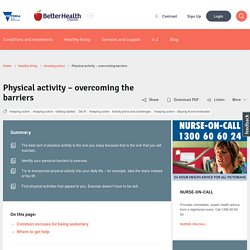
We can all come up with lots of excuses to avoid exercise. Body Image and Exercise. Motivators and Barriers to Exercise - Australian Fitness Academy. Overcoming Barriers to Physical Activity. Given the health benefits of regular physical activity, we might have to ask why Americans are not active at recommended levels.
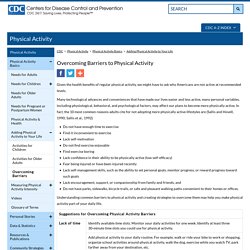
Many technological advances and conveniences that have made our lives easier and less active, many personal variables, including physiological, behavioral, and psychological factors, may affect our plans to become more physically active. In fact, the 10 most common reasons adults cite for not adopting more physically active lifestyles are (Sallis and Hovell, 1990; Sallis et al., 1992) Understanding common barriers to physical activity and creating strategies to overcome them may help you make physical activity part of your daily life. Content in the “Personal Barriers” section was taken from Promoting Physical Activity: A Guide for Community Action (USDHHS, 1999). Excessive Exercise. When Exercise Does More Harm than Good. Psychology Today Australia. I have always called myself an extreme health nut.
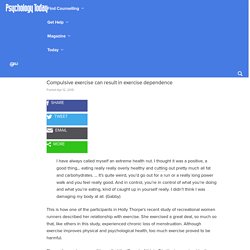
I thought it was a positive, a good thing… eating really really overly healthy and cutting out pretty much all fat and carbohydrates. … It’s quite weird, you’d go out for a run or a really long power walk and you feel really good. And in control, you’re in control of what you’re doing and what you’re eating, kind of caught up in yourself really. I didn’t think I was damaging my body at all. (Gabby) This is how one of the participants in Holly Thorpe’s recent study of recreational women runners described her relationship with exercise.
Thorpe focused on a condition called the ‘Female Athlete Triad,’ a term coined by the American College of Sports Medicine (ASCM) in 1992. The potential positive and negative effects of exercise and sports on the body. (5) Exercise, Stress, and the Brain. High Cortisol Symptoms: What Do They Mean? Cortisol is known as the stress hormone because of its role in the body’s stress response. But cortisol is about more than just stress. This steroid hormone is made in the adrenal glands. Most of the cells in our bodies have cortisol receptors that use cortisol for a variety of functions, including blood sugar regulationinflammation reductionmetabolism regulationmemory formulation Cortisol is important for your health, but too much of it can wreak havoc on your body and cause a number of unwanted symptoms. High cortisol can cause a number of symptoms throughout your body.
Stress vs. Anxiety – Knowing the Difference Is Critical to Your Health - Mental Health First Aid. By Franzi Ross on June 8, 2018 Most people experience stress and anxiety at some point in their lives. Depending on the level of severity, they can detrimentally impact one’s quality of life. Although stress and anxiety share many of the same emotional and physical symptoms – uneasiness, tension, headaches, high blood pressure and loss of sleep – they have very different origins. Determining which one you’re experiencing is critical to finding an effective treatment plan and feeling better. Generally, stress is a response to an external cause, such as a tight deadline at work or having an argument with a friend, and subsides once the situation has been resolved.
Anxiety is a person’s specific reaction to stress; its origin is internal. Those living with anxiety, as well as chronic stress, will likely benefit from supervised care and should consider seeing a licensed mental health professional. Difference Between State and Trait Anxiety. Exercise Addiction I The Feed.